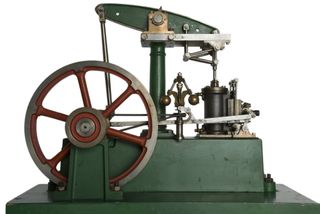Many things that we know today, cars, trains, aircraft, and factories, wouldn't be possible without the assistance of steam engines back then. These primitive engines would lead the way in the world of modern industry as we know it, exponentially increasing the effectiveness of transportation, agriculture, and manufacturing.
The first practical steam engine is thought to be invented in 1698 when Thomas Savery invented a steam-powered water pump. Steam engines were perfected in the late 1700s by James Watt, who went on to fuel the Industrial Revolution, previously mentioned as one of the most monumental leaps of technology in history.
Arguably the most important part of the invention of the steam engine was the fact that it inspired the invention of many other engines, gasoline, diesel, jet fuel, and many others. Steam was truly an important part of history.
Fun Facts:
- The first steam engines were actually very expensive, They required tons of coal and were very inefficient.
- The term "horsepower" actually came from James Watts, who used the term to describe how many horses were required to produce the amount of energy his engine produced.
- The first successful commercial steamboat was the Clermont developed by Robert Fulton in 1807.
The first steam engine:

No comments:
Post a Comment
Please be respectful. Think to yourself, "Would I say this to a child?"